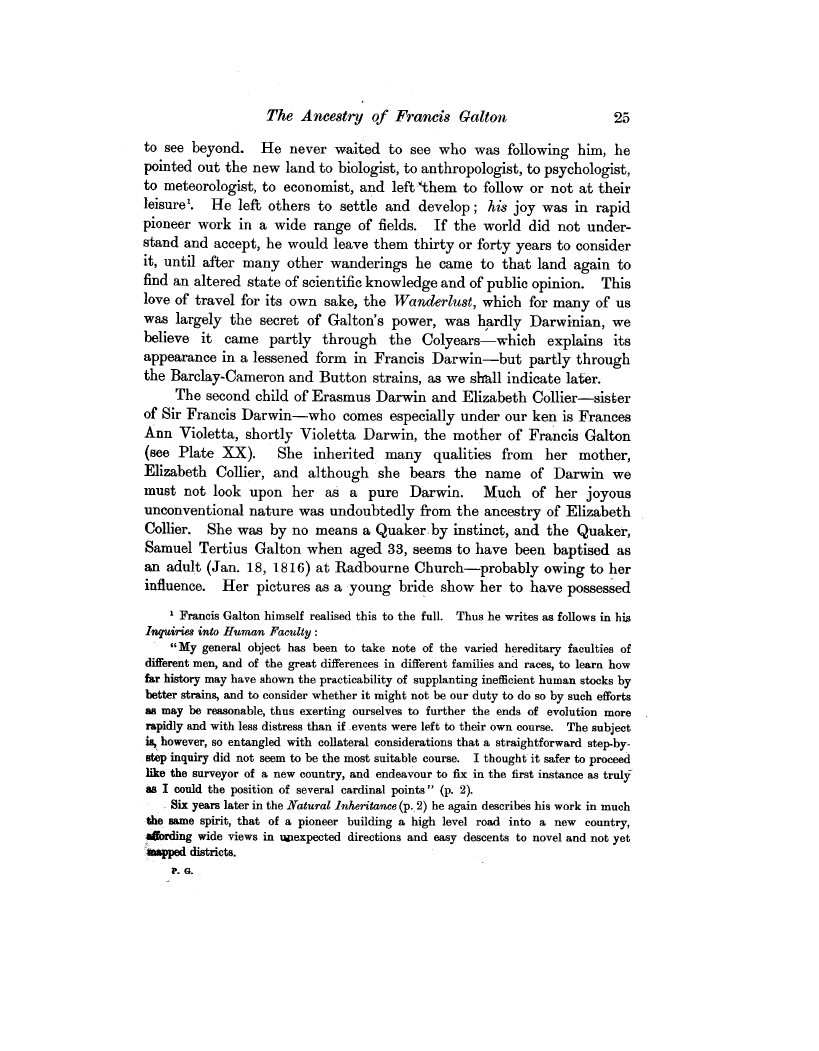| ||||||

OCR Rendition - approximate
The Ancestry of Francis Galton 25 to see beyond. He never waited to see who was following him, he pointed out the new land to biologist, to anthropologist, to psychologist, to meteorologist, to economist, and left-Ythem to follow or not at their leisure'. He left others to settle and develop ; his joy was in rapid pioneer work in a wide range of fields. If the world did not understand and accept, he would leave them thirty or forty years to consider it, until after many other wanderings he came to that land again to find an altered state of scientific knowledge and of public opinion. This love of travel for its own sake, the Wanderlust, which for many of us was largely the secret of Galton's power, was hardly Darwinian, we believe it came partly through the Colyears-which explains its appearance in a lessened form in Francis Darwin-but partly through the Barclay-Cameron and Button strains, as we shall indicate later. The second child of Erasmus Darwin and Elizabeth Collier-sister of Sir Francis Darwin-who comes especially under our ken is Frances Ann Violetta, shortly Violetta Darwin, the mother of Francis Galton (see Plate XX). She inherited many qualities from her mother, Elizabeth Collier, and although she bears the name of Darwin we must not look upon her as a pure Darwin. Much of her joyous unconventional nature was undoubtedly from the ancestry of Elizabeth Collier. She was by no means a Quaker. by instinct, and the Quaker, Samuel Tertius Galton when aged 33, seems to have been baptised as an adult (Jan. 18, 1816) at Radbourne Church-probably owing to her influence. Her pictures as a young bride show her to have possessed ' Francis Galton himself realised this to the full. Thus he writes as follows in his Inquiries into Human Faculty "My general object has been to take note of the varied hereditary faculties of different men, and of the great differences in different families and races, to learn how far history may have shown the practicability of supplanting inefficient human stocks by better strains, and to consider whether it might not be our duty to do so by such efforts as may be reasonable, thus exerting ourselves to further the ends of evolution more rapidly and with less distress than if -events were left to their own course. The subject is, however, so entangled with collateral considerations that a straightforward step-bystep inquiry did not seem to be the most suitable course. I thought it safer to proceed like the surveyor of a new country, and endeavour to fix in the first instance as truly as I could the position of several cardinal points" (p. 2). Six years later in the Natural Inheritance (p., 2) he again describes his work in much the same spirit, that of a pioneer building a high level road into a new country, wording wide views in wexpected directions and easy descents to novel and not yet mapped districts. P. G.
|